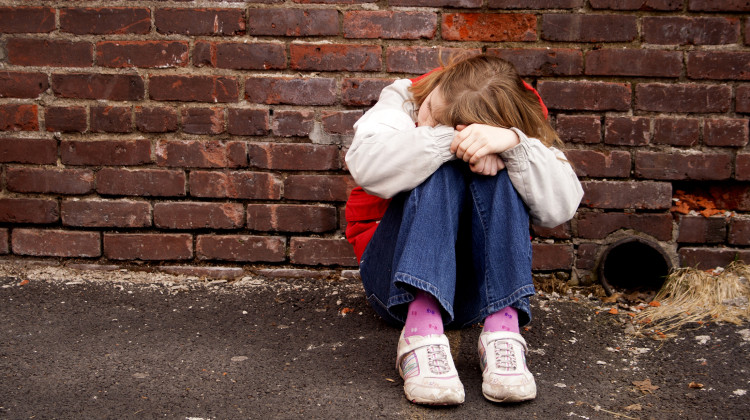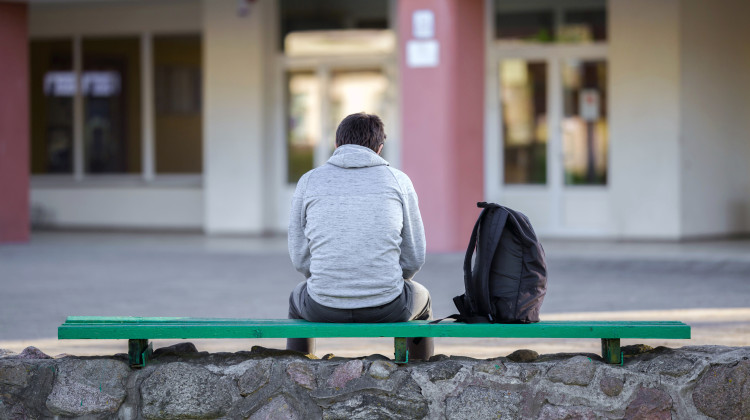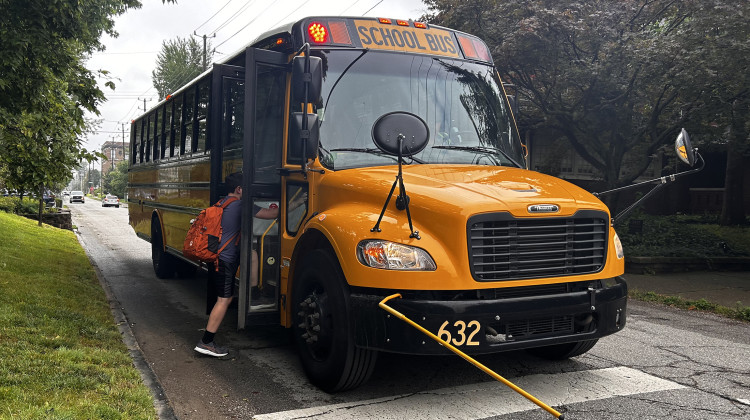
At least 3,100 students are enrolled in the summer learning lab program that can serve about 7,000 students during summer 2021.
Eric Weddle/WFYI NewsAs the school year ends across Central Indiana, it’s still unclear how much learning loss students face due to the pandemic. Early state standardized testing results show a drop in scores — a sign that students have not kept pace with their grade level learning. In order to help students catch up, the United Way of Central Indiana (UWCI) and education reform group The Mind Trust teamed up to offer summer learning labs across Marion County.
Hundreds of teachers are expected to teach thousands of students in grades 1-9 at least three hours of academics a day, in addition to other activities during the full-day, five week program.
Ann Murtlow, president and CEO of UWCI, said the focus is to help students who were disrupted the most by pandemic due to routine changes, a lack of peer socialization, as well as a lack of familiarity with devices in order to complete online learning.
That means focusing on the youngest grade levels.
“As you get in the first, second, third grades, you start to really bump up against some very significant academic milestones — that if you don't hit — you're going to fall further and further behind,” Murtlow said. “So I would say the urgency of the situation in those grades is very great.”
What To Expect
The five-week program, which begins June 21, is a partnership between school districts, charter schools and organizations across Marion County to host 39 learning lab sites. Some of the school districts partnering with the program include Indianapolis Public Schools and the Metropolitan School District of Decatur Township.
Sites are trying to limit each classroom to 20 kids so instructors can focus intently on English and math. Some sites, such as BELIEVE Circle City High School, will even have two classroom aides in addition to a teacher, in order to provide more individualized support. That includes whole groups, small groups and individualized instruction.
Certain locations will also provide some hybrid in-person and virtual classes for families who need that option.
The learning labs will be a combination of academic and enrichment sessions. The academic sessions will be grade-level material.
"So even if you're in a community center, for example, and there are 20 kids that are all in different grades, those kids will get individualized attention at [the] grade level that's applicable to them," Murtlow said.
Brandon Brown, CEO of The Mind Trust, said the goal is to provide rigorous, culturally relevant materials that are applicable to diverse backgrounds.
“We wanted to choose an exceptionally high-quality curriculum,” Brown said. “In large part, because we didn't want this program to be focused on remediation. We really wanted the program to be focused on acceleration.”
But fun activities will also be emphasized to keep students interested. Participants will be able to engage in interactive enrichment opportunities, such as theater and coding. Partnerships for the enrichment sessions include National Geographic Explorer’s Club, the National Dance Institute and Playworks Indiana.
Students will focus on academic instruction for the first four hours and complete their enrichment activities the last four hours of each day. At BELIEVE Circle City High School this includes Wednesday field trips that involve going to the NCAA Hall of Fame and an Indianapolis Indians baseball game, said Jawn Manning, dean of students at the school.
The school will also facilitate 30-minute community circles each morning to help bridge the gap of lost socialization.
“Students will have time and space to interact with their peers, learn appropriate interaction with their peers, and also just express their emotions and feelings about the world around them and in their personal lives,” Manning said.
Program Cost, Enrollment
The Mind Trust and UWCI received more than $11.1 million in state funding through a one-time learning recovery grant, which will help pay for the cost of the summer program. This includes paying for the Lavinia Group, which creates culturally relevant curriculum, teacher training and materials for students. Brown anticipates most of the learning recovery grant will go toward operating the learning lab just for this summer.
The two groups also contributed a combined $500,000 toward planning the program.
At least 3,100 students had enrolled as of Tuesday, and the program can serve about 7,000 students. When asked about the lack of enrollment, Murtlow said families choosing other summer programs could be a reason.
But Murtlow hopes enrollment will increase as the June 10 registration deadline nears.
“We know that education is the best path out of poverty,” Murtlow said. “It's the best predictor of financial stability and growth as adults, and we want to be part of the solution.”
But some sites are almost full or completely full. At BELIEVE Circle City High School, 60 students have enrolled in the 80 available seats.
Hiring Teachers
Manning hopes students at the learning lab will finish the program at least one grade level above where they started.
“So for those students who are right on the cusp of being ready for their ninth grade year, we get them there before they start high school,” Manning said.
But that means having enough staff to help those students.
The Mind Trust anticipates at least 500 certified teachers, aides, site directors and facilitators will be hired. As of Tuesday, approximately 160 teachers were hired across all of the learning labs.
Manning said it has been a bit difficult to hire teacher aides at the small school that only had 53 enrolled students this past academic year. But she said they only need to fill two more positions. One of the reasons hiring could be easy after the difficult past two years is because teachers and instructional coaches are receiving a $10,000 stipend — estimated to be about twice as much as they would earn during a traditional summer school session.
Future Of The Program
Leaders of The Mind Trust and UWCI said they are excited about the opportunity to rethink education with the community and potentially work together long-term.
“What was there before wasn't working either,” Brown said. “And there's no way that once we get through the pandemic that it makes sense to go back to normal, because that wasn't working for kids.”
At each summer learning lab, students will take a short assessment aligned with state standards at the beginning and end of the program to measure student progress. The groups aim to share program results by September.
Contact reporter Elizabeth Gabriel at egabriel@wfyi.org. Follow on Twitter: @_elizabethgabs.
 DONATE
DONATE






 Support WFYI. We can't do it without you.
Support WFYI. We can't do it without you.